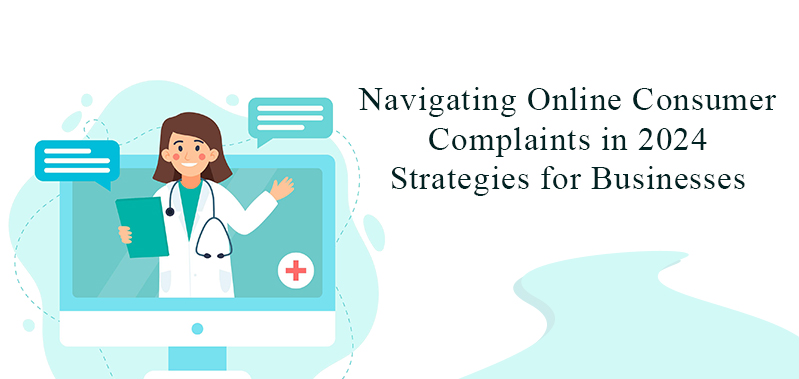
Navigating Online Consumer Complaints in 2024 - Strategies for Businesses
In the dynamic healthcare environment, managing grievances and complaints in 2024 is crucial for various purposes. Hospitals have rules about how they handle patient complaints, called grievances.
As we know, hospitals play a vital role in protecting and promoting the rights of patients. It's essential for patients and their representatives to be aware of these rights and for hospitals to establish effective processes for addressing any grievances that may arise. Hospitals must comply with these rules:
Notice of Rights
Patients must be informed about their rights before receiving or stopping care. Hospitals must set up a system for quickly handling patient complaints and inform patients about how to file a grievance. The hospital's governing body oversees this process and reviews and resolves complaints. Patients must be provided with clear instructions on submitting a grievance, and the hospital must establish time frames for reviewing and responding to complaints. When resolving a grievance, the hospital must provide the patient with written notice of the decision, including steps taken to investigate the grievance and the completion date.
Exercise of Rights
Patients have the right to participate in developing their care plans and make informed decisions about their treatment. They can also create advance directives specifying their healthcare preferences and have these directives followed by hospital staff. Additionally, patients have the right to have a family member or representative notified promptly upon admission to the hospital.
Privacy and Safety
Patients have the right to personal privacy and to receive care in a safe environment free from abuse or harassment.
Confidentiality of Patient Records
Patients have the right to the confidentiality of their medical records and access to their records upon request. Hospitals must not delay or obstruct patients' efforts to access their records.
Restraint or Seclusion
Patients have the right to be free from physical or mental abuse, including restraint or seclusion used as a means of coercion, discipline, convenience, or retaliation by staff. Restraint or seclusion may only be used to ensure immediate physical safety and must be discontinued as soon as possible. Detailed guidelines outline the appropriate use of restraint or seclusion, including training requirements for staff and reporting obligations in case of patient death associated with these interventions.
Patient Visitation Rights
Hospitals must have written policies regarding patient visitation rights, including any necessary restrictions. Patients must be informed of their visitation rights and have the right to receive visitors of their choice, regardless of race, religion, gender identity, or disability.
Steps For Businesses to Resolve Grievances and Complaints in 2024
As per the CMS grievance interpretive guidelines, patients have the right to receive care in a safe place, and for hospital or business staff, it's imperative to be aware of and follow the hospital grievance and complaint policy. Here are the prime steps that a business could take to resolve grievances and complaints in 2024.
Understand the Interpretive Guidelines
For healthcare businesses or hospitals, it's important to ensure patients are treated in an environment deemed safe by reasonable standards. Hospitals must adhere to best practices for infection control, security, and emotional well-being. Vulnerable patients, like newborns and children, receive particular attention. Hospitals should identify and mitigate risks for self-harm or harm to others, offering appropriate care and monitoring. Measures may include 1:1 monitoring, removal of harmful items, and adherence to national safety standards. While complete risk elimination isn't possible, hospitals must demonstrate efforts to minimize risks, such as ligatures, sharps, and access to harmful substances, in line with recognized guidelines.
Educate and Train Healthcare Staff
Hospitals must ensure staff receive comprehensive education and training on identifying patients at risk, environmental safety factors, and mitigation strategies. This training extends to all personnel involved in clinical care, including employees, volunteers, and contractors. Hospitals can customize training to suit their services and patient demographics. New staff should receive training during orientation, with regular updates when policies change. CMS advises initial training followed by refresher courses at least every two years to maintain competency. This approach ensures staff are equipped to safeguard patients and maintain a safe environment consistently.
Eradicate Environmental Risks
Instances of noncompliance, such as ligature risks not immediately endangering patients, should be rectified promptly within the timeframe specified by CMS, the State Agency (SA), or the Accrediting Organization (AO). Hospitals must implement interim patient safety measures to mitigate risks until full correction is achieved. These measures, like continuous visual or 1:1 observation, address identified safety concerns. The goal is to swiftly address any potential hazards to patient safety, ensuring a secure environment while corrective actions are implemented.
Effective management of grievances and complaints in 2024 in the healthcare sector is paramount in ensuring patient rights and safety. Hospitals must adhere to established rules, including informing patients of their rights, safeguarding patient privacy and safety, and addressing grievances promptly. Businesses must align with CMS guidelines, educate staff on risk identification and mitigation, and swiftly address environmental hazards. By prioritizing patient safety and satisfaction, hospitals and businesses can navigate online consumer complaints effectively, fostering trust and delivering high-quality patient care.





Many patients have faced the irresponsible behavior of medical staff towards their complaints. Glad to read these ways and the helpful approach of CMS